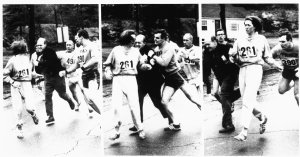Kathrine Switzer: Still Running Strong
Alumna 2011 inductee of the National Women's Hall of Fame

Kathrine Switzer ’68, G ’72, who made history by almost getting thrown out of the 1967 Boston Marathon as a 20-year-old Syracuse University junior, was inducted into the National Women’s Hall of Fame in Seneca Falls, N.Y., in September. A pioneer in women’s running, Switzer was honored for the social change she brought after breaking the gender barrier at Boston and for her positive work in creating opportunities and equal status for women in sports through running.
Switzer won the New York City Marathon in 1974, ran 38 marathons, and went on to create an international running program for Avon, organizing more than 400 races in 27 countries for more than 1 million women. She led the drive to make the women’s marathon an official Olympic event (in Los Angeles, 1984) and teamed
with Avon again in the late 1990s to create a running program focused on fitness, health, and empowering women worldwide.
An Emmy Awardwinning broadcaster, she’s covered the Olympics, international running events, and marathons in New York, Boston, and Chicago for ABC, CBS,
NBC, ESPN, and TVNZ (New Zealand). She speaks worldwide, runs her own sports-promotion company, and has been interviewed by everyone from Oprah to the BBC. She has written three books: Marathon Woman (2007), Running and Walking for Women Over 40 (1998), and with Roger Robinson, her husband and fellow runner, writer, and sports commentator, 26.2 Marathon Stories (2006).

Despite her busy career and lifestyle, Switzer maintains ties to SU and Central New York. She serves on The College’s Board of Visitors and on the Advisory Board of the David B. Falk College of Sport and Human Dynamics. For 25 years, she has done color commentary for Utica’s Boilermaker road race from the backof a Harley-Davidson, “the best seat in the house,” she quips. She fired the starting gun for the inaugural EmpireState Marathon in Syracuse, October 16, 2011, but didn’t run it because she had just run her 39th marathon in Berlin to launch the German edition of Marathon Woman.
Switzer has devoted her life to running, which, in turn, has given her opportunities of a lifetime. It started in Boston, where an irate official tried to rip No. 261 from her SU sweatshirt and drag her from the all-men’s race, changing her life forever. Or rather, the photos did. Splashed around the world, the images sparked a furor, and wound up in Life Magazine’s “100 Photographs that Changed the World.” But it was the work Switzer did after Boston that got her into the National Women’s Hall of Fame.
“Boston was an accident, something that happened to me,” she says. “I didn’t know I was creating social change; I just knew women needed more opportunities. Once I got out there and started doing it, I saw how incredibly powerful it was. So many women in the Hall of Fame were just doing what they thought was right. And sometimes when you just do what you think is right, it can create a revolution.”
Media Contact
Judy Holmes
